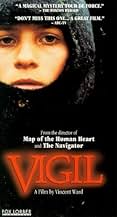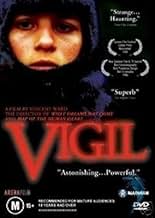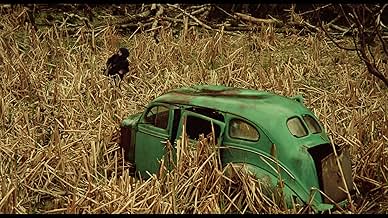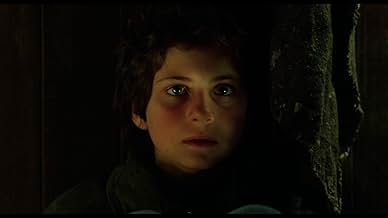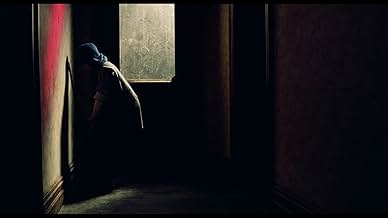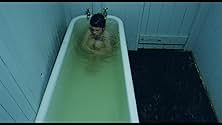अपनी भाषा में प्लॉट जोड़ेंA lonely girl living on an isolated, mist-cloaked farm is confronted with the changes wrought by a stranger that arrives.A lonely girl living on an isolated, mist-cloaked farm is confronted with the changes wrought by a stranger that arrives.A lonely girl living on an isolated, mist-cloaked farm is confronted with the changes wrought by a stranger that arrives.
- पुरस्कार
- 3 जीत और कुल 2 नामांकन
कहानी
क्या आपको पता है
- ट्रिवियाFirst ever film from New Zealand to be selected to screen in competition at the Cannes Film Festival.
- भाव
Ethan Ruir: What are you after?
Elizabeth Peers: I want you to keep your hands off my daughter.
- कनेक्शनFeatured in Century of Cinema: Cinema of Unease: A Personal Journey by Sam Neill (1995)
फीचर्ड रिव्यू
SPOILER: I don't know when I've seen a film that was so beautiful and yet so utterly baffling. It's not like any other movie you'll ever see. Every single image is stark and brutal--the director, Vincent Ward, is trying to enter a primitive painting and make drama out of it. And he has a perfect setting--a sheep farm in New Zealand--that comes from Thomas Hardy's accounts, in which nature wages an unending, unfathomable conspiracy against the characters. It's in the actual story Ward tells that he gets into trouble. His 12-year-old heroine, Toss (Fiona Kay) witnesses her farmer father's death from an accidental fall (as he tries to rescue a sheep) and the camera sits on her impassive face for the first of several eternities. Her restless mother (Penelope Stewart) seizes the opportunity to put the farm up for sale. Her dotty grandfather (Bill Kerr) is like every dotty grandfather in the movies--he putters around, muttering feisty-old-goat aphorisms and tinkering with whimsical machines--and quickly becomes insufferable. Ethan, (Frank Whidden) the hunter who carried the father's corpse back to the farm, shows up again looking to replace the father. Toss and her mother are both attracted and repelled by him.
In one remarkable sequence, we see Toss experimenting with Ethan's gun. She looks through the gun sights and begins tracking Ethan through the house, as if she were ambushing James Bond. When Ethan sees her, he steps boldly toward her and removes the sight, which she had taken off the gun and is holding to her eye like a telescope. We are in D.H. Lawrence sexual-awakening territory now, but the combination of Lawrence and Hardy doesn't ignite the way it should--the director's austere manner (keeping everything at a distance) begins to seem remote and rather obscure. The scenes don't follow from each other; each one goes off on its own, and the characters shift attitudes and allegiances to no clear purpose. The performers start doing a lot of staring and squinting into the camera (for LONG periods) only Stewart makes any impression, as she's the only one who actually engages with the person she's speaking to (and the only one who seems to have any grasp on reality.) The last fourth of the movie is unspeakably depressing. We finally realize that this is the kind of film where explanations and logic are left out, and the resultant confusion is presented as "depth". Fascinating and infuriating, in just about equal measure.
In one remarkable sequence, we see Toss experimenting with Ethan's gun. She looks through the gun sights and begins tracking Ethan through the house, as if she were ambushing James Bond. When Ethan sees her, he steps boldly toward her and removes the sight, which she had taken off the gun and is holding to her eye like a telescope. We are in D.H. Lawrence sexual-awakening territory now, but the combination of Lawrence and Hardy doesn't ignite the way it should--the director's austere manner (keeping everything at a distance) begins to seem remote and rather obscure. The scenes don't follow from each other; each one goes off on its own, and the characters shift attitudes and allegiances to no clear purpose. The performers start doing a lot of staring and squinting into the camera (for LONG periods) only Stewart makes any impression, as she's the only one who actually engages with the person she's speaking to (and the only one who seems to have any grasp on reality.) The last fourth of the movie is unspeakably depressing. We finally realize that this is the kind of film where explanations and logic are left out, and the resultant confusion is presented as "depth". Fascinating and infuriating, in just about equal measure.
टॉप पसंद
रेटिंग देने के लिए साइन-इन करें और वैयक्तिकृत सुझावों के लिए वॉचलिस्ट करें
- How long is Vigil?Alexa द्वारा संचालित
विवरण
- रिलीज़ की तारीख़
- कंट्री ऑफ़ ओरिजिन
- आधिकारिक साइटें
- भाषा
- इस रूप में भी जाना जाता है
- Vigil - Zeit der Stürme
- फ़िल्माने की जगहें
- उत्पादन कंपनियां
- IMDbPro पर और कंपनी क्रेडिट देखें
इस पेज में योगदान दें
किसी बदलाव का सुझाव दें या अनुपलब्ध कॉन्टेंट जोड़ें


